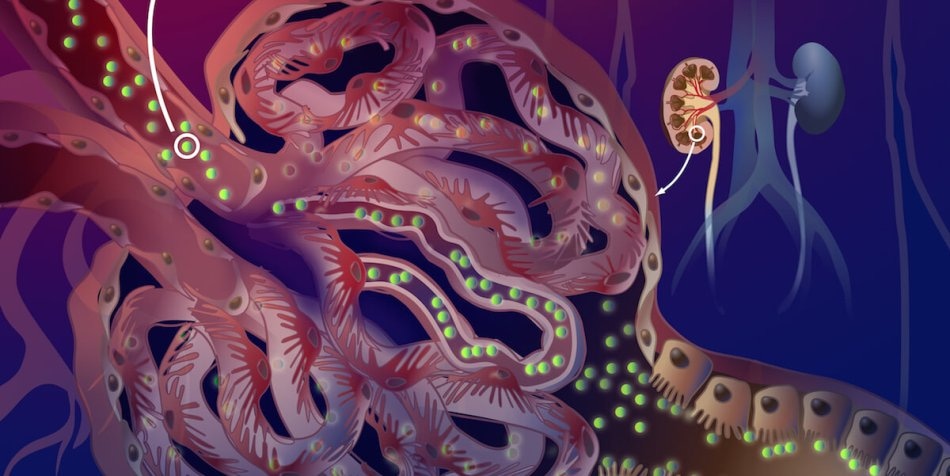Aug 24 2018
Just like the Mission: Impossible movie scene where Tom Cruise had to perform all sorts of moves to avoid detection in order to sneak into the vault, similarly a targeted drug needs to be sneaked into a kidney and to prevent it from getting eliminated from the body.
 Nanoparticles move past the glomerular filtration barrier of the kidney to target diseased cells. (Image credit: Yekaterina (Katya) Kadyshevskaya from the USC Bridge Institute at USC Michelson Center for Convergent Bioscience
Nanoparticles move past the glomerular filtration barrier of the kidney to target diseased cells. (Image credit: Yekaterina (Katya) Kadyshevskaya from the USC Bridge Institute at USC Michelson Center for Convergent Bioscience
Kidneys serve as the filtering agents in the human body, they work to get rid of minute particles that they sense do not belong. In case the kidney misses filtering out a particle by excreting it through urine, it may be eliminated by the liver, which uses macrophages to hunt for and push out the foreign bodies.
Scientists at the USC Viterbi School of Engineering, together with colleagues from the Keck School of Medicine at USC, have created peptide nanoparticles to outsmart the biological system and target the kidney cells. The innovation may prove significant in treating chronic kidney disease.
Out of three Americans, one will have chronic kidney disease in his/her lifetime. Up to now, there have been few solutions for progressive kidney disease beyond dialysis and kidney transplant—both of which are extremely costly and taxing. Earlier, doctors would also have to prescribe heavy doses of medication as they anticipated some of the medication would be able to reach and target the kidney. However, this heavy dosing had unfavorable effects on other organs in the body.
While targeted drug delivery has long been an area of focus for cancer research, nanoparticles for targeted drug delivery for the kidneys has mostly gone uninvestigated, says the study’s main author, Eun Ji Chung, a WiSE Gabilan Assistant Professor and Assistant Professor of Biomedical Engineering, Chemical Engineering and Materials Science, and Nephrology and Hypertension at USC and a professor in the new USC Michelson Center for Convergent Bioscience.
Basically, the scientists took a number of months to develop their kidney targeting particle. This nanoparticle is a micelle, and is 10-20 times smaller than a traditional nanoparticle. This specific micelle is synthesized from a peptide chain that is formulated from lysine and glutamic acids. The additional small size of the nanoparticle allows passage into the kidneys via the primary barrier of kidney filtration while the peptide allows the nanoparticle to remain in the kidneys and potentially release a drug at the site of the disease without getting eliminated in the urine. In this way, the scientists are making the most of a natural mechanism of the body to target the kidneys, and can lessen systemic off-target side effects that are typical to most kidney drugs.
Results of In Vivo Testing:
Fluorescent-labeled nanoparticles were injected into mice by the scientists. They learned that the nanoparticles they had created were more present in the kidney compared to other parts of the body. These particles, therefore, could carry drugs more selectively than earlier tests by other scientists. Moreover, these biocompatible, bio-degradable particles were able to be eliminated from the body in less than one week and would not harm other organs.
The research “Design and in vivo characterization of kidney-targeting multimodal micelles for renal drug delivery,” was conducted by Eun Ji Chung, Jonathan Wang, Christopher Poon, Deborah Chin, Sarah Milkowski, Vivian Lu at the Viterbi School of Engineering; and Kenneth R. Hallows of the Keck School of Medicine at USC. It was included in the journal Nano Research and Professor Chung was chosen as a Young Innovator in Nanobiotechnology from the journal.
Funding for this study was provided by the University of Southern California (Provost Fellowship), the National Heart, Lung, and Blood Institute at the NIH, and the U.S. Department of Defense.